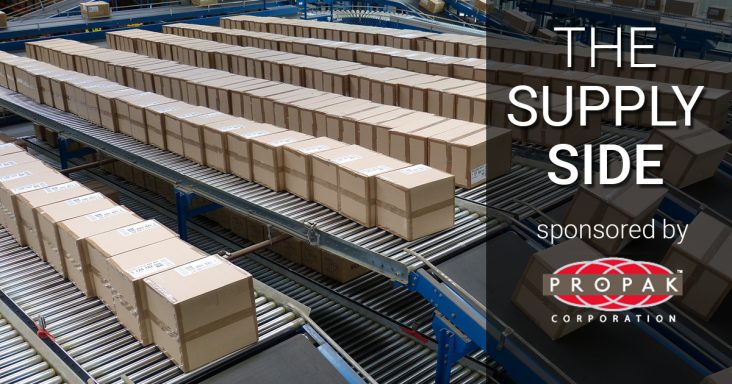The Supply Side: Inflation boosts secondhand shopping numbers
by November 21, 2022 1:25 pm 1,633 views

Inflationary pricing and rising interest rates have more consumers considering buying secondhand items. The trend once more prevalent among Gen Z consumers — young adults under age 25 — is now becoming more mainstream.
Millennial consumer Ashlea Hanks, 32, of Dallas, recently purchased home furnishings on Facebook Marketplace, opting to outfit her new abode with secondhand furniture she says is more affordable and sustainable. Hanks also said she scored a secondhand refrigerator for a great price thanks to social media. She is also open to receiving recycled products as gifts.
Anna Jackson of Fayetteville, a 35-year-old homeowner, said she shopped at Potter’s House thrift shop in Fayetteville for home furnishings a few months ago because she liked the value and was looking for vintage mid-century modern pieces for her home. Jackson said she prefers to shop marketplaces for some luxury items that would stretch the budget if purchased new. Jackson said she hasn’t yet gifted used products but has not ruled it out.
Market analysts with Morning Consult said more consumers are likely to seek out the best possible values, including thrift shopping.
ThredUp, an online consignment and thrift store for fashion apparel, recently reported that 244 million consumers are open to shopping for secondhand products. ThredUp says from its survey that the U.S. secondhand market is expected to more than double by 2026, reaching $82 billion. The market reported a record 32% growth in 2021.
ThredUp said technology and online marketplaces are driving growth in the U.S. secondhand market. The report said 70% of consumers say it’s easier to shop for secondhand items than five years ago, thanks to the emergence of technology and online marketplaces. By 2026, ThredUp estimates that the online resale market will make up 50% of the total category sales.
The survey found that 62% of Gen Z and Millennials — ages 26 and 41 — say they often look for a secondhand item by checking multiple marketplaces before they purchase new. When shopping for apparel, 41% said the first place they look is a secondhand marketplace.
The growing trend among younger consumers is part of the reason Walmart sought out a partnership with ThredUp in May 2020. Walmart said the deal with ThredUp allowed it to offer more iconic brands as it joined the popular fashion resale market. On Walmart.com, the ThredUp portal offers up to 750,000 pre-owned items across women’s and children’s clothing, accessories, footwear and handbags.
Since the Walmart deal, ThredUp has also formed partnerships with Gap, Athleta and Banana Republic. Target announced in May an agreement with ThredUp that features items from its private brands, limited-time designer collections and select luxury items for resale. Target tested its online thrift shop in 2015 but shuttered the business after six months. Target management said this is another test with ThredUp, given the rise in demand for resale items.
Jefferies analysts estimated the resale market totaled $15 billion last year and is expected to more than triple to $47 billion by 2025.
Resale is a way for retailers to get in front of Gen Z and millennial shoppers who enjoy the “treasure hunt” and green aspects of thrifting, said Ashley Helgans, an equity research analyst who follows the sector for Jefferies. Through secondhand purchases, younger consumers may develop an affinity for new brands and decide to purchase directly from the original seller, she said.
Luxury brands also have a stake in the pre-owned game, as Burberry and Alexander McQueen offer resale for shoppers on their websites. Poshmark and Mercari have also grown their businesses, focusing primarily on luxury fashion brands for resale. South Korean tech giant Navar recently purchased Poshmark for $1.2 billion. Navar retained Poshmark’s management and the brand name.
California-based eBay was one of the first marketplaces where consumers could resell items. CEO Jamie Iannone, a former Walmart and Sam’s Club executive, now runs the business. The company said the best-selling items on its site this year have been mobile phones and accessories, video gaming consoles, health supplements, baby items, computers and fashion.
Other bidding marketplaces like StockX, Rebag and The Real Real have become more mainstream, allowing consumers to purchase and sell authenticated pre-owned items from designer handbags to gaming consoles and sports collectibles.
Walmart and Amazon also each sell other refurbished goods on their online marketplaces. The retailers have said they sought to resale higher priced items like smartphones, robotic vacuums and computer items returned by customers. The wholesale market is a step or two up the value chain over the donation bin. The products often end up on marketplace sites. Amazon and Walmart also have sellers on their marketplaces who offer refurbished tech products.
While Gen Z consumers have been leaders in the retail resale trends, analysts said consumers of all ages can appreciate value during rising prices. McKinsey & Associates recently published a report that looked at holiday shopping sentiment amid uncertain economic times.
“Despite continued economic uncertainty, U.S. shoppers are looking forward to spending for the holidays. Retailers that offer good value will come out on top,” according to the McKinsey report. “Consumers are trading down and looking for values where they can find it.”
McKinsey found that consumers are being more surgical about how they spend. Nearly half of U.S. survey respondents say they would switch stores if they found a better price elsewhere. The report stopped short of asking respondents about shopping in thrift stores or secondhand marketplaces. ThredUp’s survey found that three out of four sellers of secondhand items said they also purchase them and consider gifting them.
Editor’s note: The Supply Side section of Talk Business & Politics focuses on the companies, organizations, issues and individuals engaged in providing products and services to retailers. The Supply Side is managed by Talk Business & Politics and sponsored by Propak Logistics.
